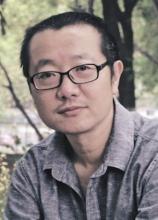To Hold Up the Sky
Review
To Hold Up the Sky
If you do not regularly read science fiction, then you may not have heard of Cixin Liu. If you have even a passing acquaintance with the genre, you are at least familiar with the name and possibly have read one or more of his books. Liu has won the Hugo Award, as well as several different genre awards in his native China on the strength of seven novels (five of which have been released in the United States) and dozens of pieces of short fiction dating back to 1989, which have been published in Science Fiction World, arguably the most widely read sci-fi periodical in the world. TO HOLD UP THE SKY gathers 11 of his shorter works from 2000 to 2017, almost all of which are seeing publication in the U.S. for the first time.
Liu’s stories are generally part allegory, part hard science. Think Aesop collaborating with Robert A. Heinlein. A common theme running through his work is that science can both solve and cause problems; art is occasionally given a status equal to science. Liu is also not above giving a story an unexpected twist or turn. This is particularly true of “Contraction,” where a group of scientists and luminaries await a predetermined moment when the universe will cease to expand and begin to contract. “Mirror” is another, which combines computer science with string theory. Liu sets the hook with a bit of a mystery near the beginning of the narrative. Although he takes a while to get to where he is going, it is worth the wait when he arrives at his destination in this past-and-present story, which lays out why it is not always a good thing to know the future.
"TO HOLD UP THE SKY does what a collection such as this is supposed to do, which is to give readers already familiar with the author's work something else to read while providing newcomers with a necessary introduction."
A mirror is also featured prominently in “Ode to Joy,” when a musician’s concert performance at a memorial for the United Nations is interrupted by a visiting artist, so to speak. This story, by the way, contains one of the most suspenseful, cringe-inducing vignettes I have read recently. I won’t give it away, other than to say that it involves an astronaut. Another visiting artist, one that uses entire worlds as its palette, is the driving force behind “Sea of Dreams.” It is attracted to Earth by an ice sculptor and proceeds to create a cosmic work that is both breathtaking and potentially deadly.
As you can see, Liu’s imagination can be wide-ranging. It also can be (there is no other word for it) weird. “Cloud of Poems” envisions a future where the earth has been hollowed out, humans are livestock for dinosaurs, and a technological god develops a fondness for poetry. I think there is a faint ARABIAN NIGHTS vibe going here. My imagination couldn’t quite stretch enough to encompass this story, thought your results may vary.
On the other hand, my two favorite stories bookend the collection. They are, probably not coincidentally, the ones that concentrate the most on the essence of what makes us human. “The Village Teacher” concerns an elderly and beloved instructor in an impoverished village who, even as he is near death, drills his students on certain principles as if their lives depend on them. “The Thinker” is a wonderfully conceived and beautifully told narrative about a chance meeting between a physician and an astronomer, which leads to a series of chaste but very important interludes across time and (in a manner of speaking) space. It transcends the romantic and science fiction genres in all of the best ways.
TO HOLD UP THE SKY does what a collection such as this is supposed to do, which is to give readers already familiar with the author's work something else to read while providing newcomers with a necessary introduction. I was in the latter camp and am now reading SUPERNOVA ERA, which was published in China in 2003 but made its first appearance in the U.S. last year.
Oh, and before I bid you adieu, I would be remiss if I did not proffer multiple tips of the fedora to the outstanding translators of these magnificent stories: Adam Lanphier (“The Village Teacher”), Joel Martinsen (“Time Migration,” “Fire in the Earth,” “Ode to Joy”), John Chu (“2018-04-01,” “Contraction,” “Sea of Dreams,” “The Thinker”), and Carmen Yiling Yan (“Mirror,” “Full Spectrum Barrage Jamming,” “Cloud of Poems”). Enjoy!
Reviewed by Stephen Hubbard on October 23, 2020
To Hold Up the Sky
- Publication Date: September 14, 2021
- Genres: Fiction, Science Fiction, Short Stories
- Paperback: 336 pages
- Publisher: Tor Books
- ISBN-10: 125030606X
- ISBN-13: 9781250306067




